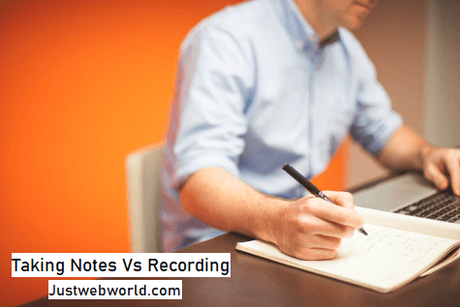When you're listening to a lecture at school or attending a business meeting, you need a way to collect information efficiently. The two main practices include manually writing down notes on a piece of paper or a laptop, as well as recording the audio.
Even though the former has been around since the dawn of time, recording is becoming more and more popular.

1] Pros and Cons of Note Taking
Overall, digital note-taking has more advantages than pen and paper.
- + With quick typing speed , it's possible to keep up with the pace of the speaker. Since you can't completely focus on what's being spoken while taking notes, it's important not to miss any information.
- + There's infinite writing material - you won't run out of paper.
- + The portability of a laptop means that you'll be able to write something down in any needed moment.
- + If something's presented in a complicated way, you can rewrite it in your own words for better understanding.
- + Quick searching. It's very easy to find something that you've already written through quick search options.
- - It's impossible to properly process the material. You listen for the sole purpose of rewriting, which is inefficient.
- - With social media , it's very easy to get distracted. Answering one message can make you lose a lot of information.
- - It's scientifically proven that you remember less when you're preoccupied with taking notes. Multitasking is not the best practice.
- - Taking notes is distracting for both the speaker and the listener, especially during an interview.
2] Pros and Cons of Recording
- + You retain 100% of the information. Nothing is lost and you can relisten to it anytime you want.
- + You're able to properly concentrate and pay attention to the speaker.
- + Studies show that recorded interviews help in developing a better relationship between the interviewer and interviewee.
- + Recordings can be converted to written form through transcription services.
- + There's no misinterpretation of the information. A recording provides an unbiased rehearsal of the interview.
- + Inexhaustible storage space. Memory space can always be expanded and all the information is in one place.
- - Technology can fail. You shouldn't depend on one piece of equipment, but rather always have a backup plan.
- - Storage space can get quite expensive for excessive amount of information. - Any loud background noise can potentially ruin the whole recording.
3] Which Is Better?
When looking at the bigger picture, recording has more advantages compared to note taking. You are able to pay more attention to the information and can always have an unbiased look at it.
By taking a closer look at the body language, speech speed and the way of expression of the speaker you'll be able to form a better connection. With notes, it almost always comes down to how the person reading it interprets the data provided. Furthermore, with a quality audio to text converter, you can easily get the written form of the audio material.
This is where audio to text transcription service comes in. Audext is a service that can transcribe audio to text automatically with maximum precision. Whether it's an interview recording, lecture note, press conference or anything else, Audext can convert it to written form up to 200 times faster than manual transcription services, as long as there is no background noise.
The AI technology uses speech recognition patterns to accurately recognize words. After the transcription is done, the user is able to manually review the end result, with every word connected to the exact timestamp at which it was spoken.
The text form is carefully formatted, since the Audext algorithm is able to differentiate between multiple speakers. If it's an emergency, you won't have to wait hours for someone to manually transcribe, edit and submit it. Audext is able to do it all in just a couple of minutes, depending on the size of the recording.
A 30-minute free trial is there to assure you that you're getting the best possible quality. Afterwards, there are both monthly and per hour plans, with prices far below any of the competitors.
Combination of audio recording and automatic transcription is the most efficient way of collecting information while reaping all the benefits. With a free 30-minute transcription, there's nothing to lose. Once you try it, you'll never want to go back to the old ways.

